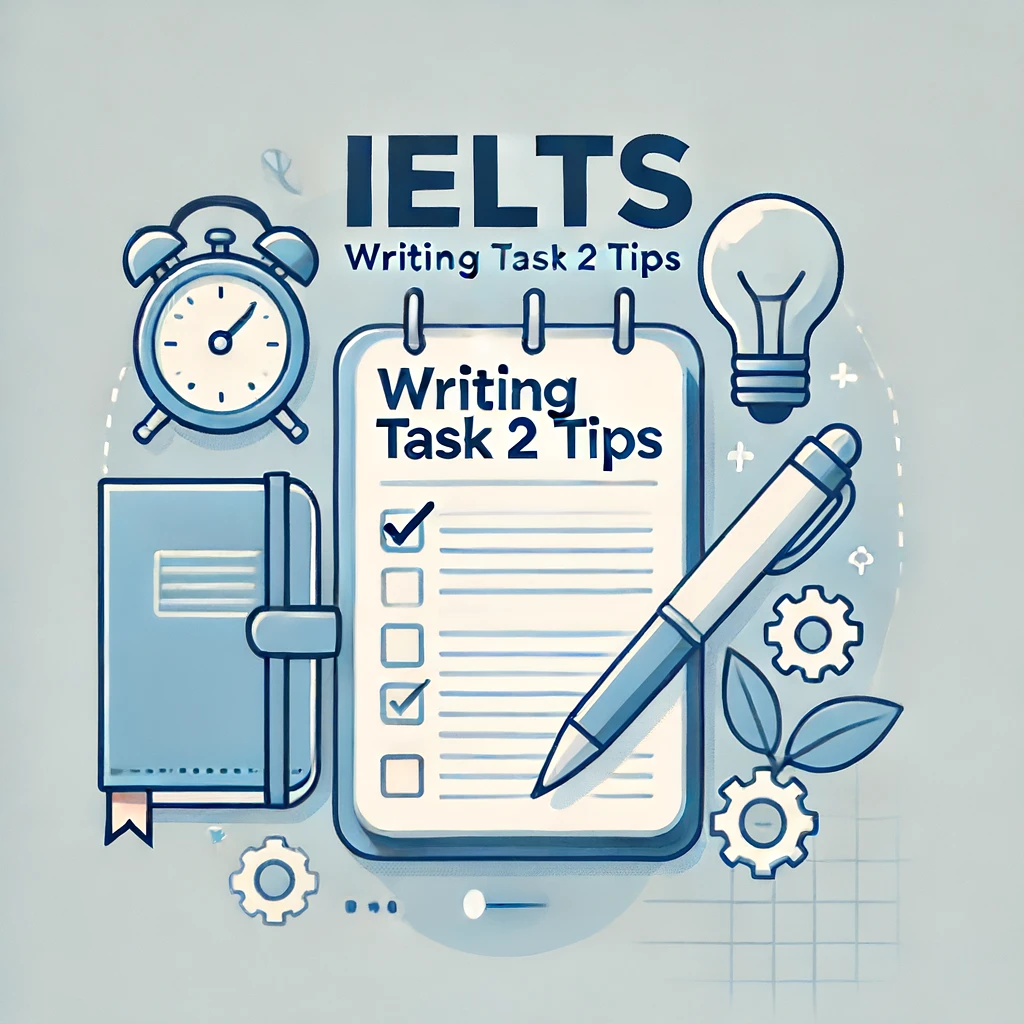IELTS Writing Task 2 Overview
Duration:
– 40 minutes
Word Limit:
– At least 250 words
Essay Types:
1. Opinion (Agree or Disagree)
2. Discussion (Discuss Both Views)
3. Problem-Solution
4. Advantage-Disadvantage
5. Direct Question
Structure:
1. Introduction:
– Brief topic introduction
– Clear thesis statement
2. Body Paragraphs:
– Paragraph 1:
– Main point/argument
– Support with examples and details
– Paragraph 2:
– Second main point/argument
– Support with examples and details
– (Optional) Paragraph 3:
– Additional point or elaboration
3. Conclusion:
– Summarize main points
– Restate thesis
– Final thought or recommendation
Key Points:
– Clarity and Coherence: Logical flow of ideas
– Vocabulary and Grammar: Use a wide range of vocabulary and varied sentences
– Task Response: Fully address the prompt
– Critical Thinking: Well-reasoned arguments with evidence
Tips for Success:
– Plan Before Writing: Outline your essay to organize thoughts
– Stay on Topic: Avoid unnecessary information
– Proofread: Check for grammatical and spelling errors
By following these guidelines, you can effectively tackle IELTS Writing Task 2 and demonstrate your ability to present a coherent and well-structured argument.
Example Essay Topics:
1. Opinion (Agree or Disagree)
1. Technology has made our lives more complicated. Do you agree or disagree?
2. University education should be free for everyone. Do you agree or disagree?
3. Advertising manipulates people. Do you agree or disagree?
4. Traditional classrooms are better than online learning. Do you agree or disagree?
5. The death penalty should be abolished worldwide. Do you agree or disagree?
6. Social media has more negative effects than positive. Do you agree or disagree?
7. Climate change is the greatest threat to humanity. Do you agree or disagree?
8. Single-sex schools are better for students. Do you agree or disagree?
9. Governments should invest more in public transportation. Do you agree or disagree?
10. Animal testing should be banned. Do you agree or disagree?
2. Discussion (Discuss Both Views)
1. Some people think children should start school at an early age, while others believe they should start at a later age. Discuss both views.
2. Some think that zoos are cruel and should be closed, while others believe they are beneficial for animal conservation. Discuss both views.
3. Some people argue that individuals should be responsible for their own health, while others believe governments should take care of it. Discuss both views.
4. Some think that studying history is essential, while others believe it is unnecessary. Discuss both views.
5. Some people prefer to live in urban areas, while others prefer rural areas. Discuss both views.
6. Some think that people should not change jobs frequently, while others believe it is beneficial. Discuss both views.
7. Some argue that the government should support artists, while others believe they should support themselves. Discuss both views.
8. Some people think that children should be taught to be competitive, while others think they should be taught to cooperate. Discuss both views.
9. Some believe that women should focus on their careers, while others believe they should prioritize family. Discuss both views.
10. Some people argue that money can bring happiness, while others believe it cannot. Discuss both views.
3. Problem-Solution
1. The rise of obesity among children is a major problem. What are the causes and solutions?
2. Increasing pollution in cities is a pressing issue. What are the causes and solutions?
3. Youth unemployment is a significant problem in many countries. What are the causes and solutions?
4. Overpopulation is becoming a serious problem in urban areas. What are the causes and solutions?
5. Many people lack access to clean drinking water. What are the causes and solutions?
6. Traffic congestion is a growing problem in large cities. What are the causes and solutions?
7. Cyberbullying among teenagers is increasing. What are the causes and solutions?
8. The decline of traditional languages is an issue in many regions. What are the causes and solutions?
9. High levels of stress among students are concerning. What are the causes and solutions?
10. The increase in mental health issues among adults is alarming. What are the causes and solutions?
4. Advantage-Disadvantage
1. Discuss the advantages and disadvantages of online shopping.
2. Discuss the advantages and disadvantages of working from home.
3. Discuss the advantages and disadvantages of living in a big city.
4. Discuss the advantages and disadvantages of using public transportation.
5. Discuss the advantages and disadvantages of learning a foreign language at an early age.
6. Discuss the advantages and disadvantages of studying abroad.
7. Discuss the advantages and disadvantages of owning a car.
8. Discuss the advantages and disadvantages of using social media.
9. Discuss the advantages and disadvantages of eating fast food.
10. Discuss the advantages and disadvantages of taking a gap year.
5. Direct Question
1. Why do you think people choose to live in big cities? What are the advantages and disadvantages of this?
2. How can schools better prepare students for the future? What changes would you recommend?
3. What are the main causes of traffic accidents? How can these be reduced?
4. What role does technology play in education? How has it changed the way we learn?
5. What are the benefits of traveling? How can travel experiences impact personal growth?
6. How can individuals contribute to environmental conservation? What actions can be taken?
7. What are the main reasons people migrate to other countries? What challenges do they face?
8. How can governments address homelessness? What measures can be implemented?
9. What are the benefits of reading books? How does reading impact personal development?
10. How can communities support elderly people? What initiatives can be introduced?
